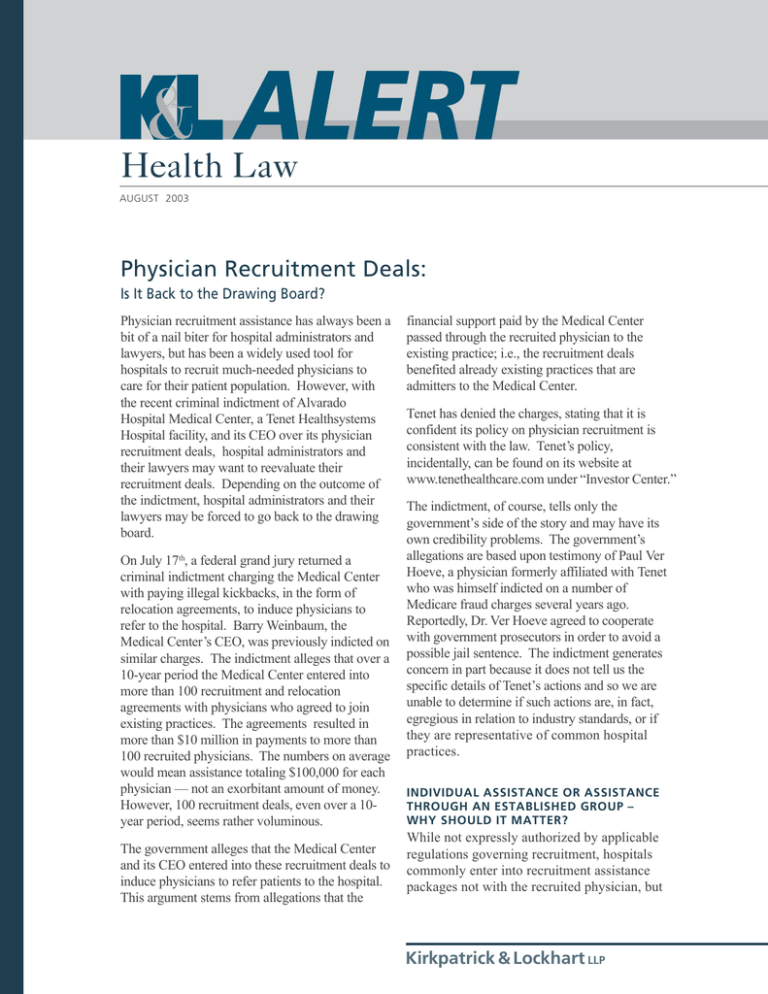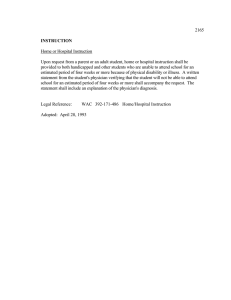
Health Law
AUGUST 2003
Physician Recruitment Deals:
Is It Back to the Drawing Board?
Physician recruitment assistance has always been a
bit of a nail biter for hospital administrators and
lawyers, but has been a widely used tool for
hospitals to recruit much-needed physicians to
care for their patient population. However, with
the recent criminal indictment of Alvarado
Hospital Medical Center, a Tenet Healthsystems
Hospital facility, and its CEO over its physician
recruitment deals, hospital administrators and
their lawyers may want to reevaluate their
recruitment deals. Depending on the outcome of
the indictment, hospital administrators and their
lawyers may be forced to go back to the drawing
board.
On July 17th, a federal grand jury returned a
criminal indictment charging the Medical Center
with paying illegal kickbacks, in the form of
relocation agreements, to induce physicians to
refer to the hospital. Barry Weinbaum, the
Medical Center’s CEO, was previously indicted on
similar charges. The indictment alleges that over a
10-year period the Medical Center entered into
more than 100 recruitment and relocation
agreements with physicians who agreed to join
existing practices. The agreements resulted in
more than $10 million in payments to more than
100 recruited physicians. The numbers on average
would mean assistance totaling $100,000 for each
physician — not an exorbitant amount of money.
However, 100 recruitment deals, even over a 10year period, seems rather voluminous.
The government alleges that the Medical Center
and its CEO entered into these recruitment deals to
induce physicians to refer patients to the hospital.
This argument stems from allegations that the
financial support paid by the Medical Center
passed through the recruited physician to the
existing practice; i.e., the recruitment deals
benefited already existing practices that are
admitters to the Medical Center.
Tenet has denied the charges, stating that it is
confident its policy on physician recruitment is
consistent with the law. Tenet’s policy,
incidentally, can be found on its website at
www.tenethealthcare.com under “Investor Center.”
The indictment, of course, tells only the
government’s side of the story and may have its
own credibility problems. The government’s
allegations are based upon testimony of Paul Ver
Hoeve, a physician formerly affiliated with Tenet
who was himself indicted on a number of
Medicare fraud charges several years ago.
Reportedly, Dr. Ver Hoeve agreed to cooperate
with government prosecutors in order to avoid a
possible jail sentence. The indictment generates
concern in part because it does not tell us the
specific details of Tenet’s actions and so we are
unable to determine if such actions are, in fact,
egregious in relation to industry standards, or if
they are representative of common hospital
practices.
INDIVIDUAL ASSISTANCE OR ASSISTANCE
THROUGH AN ESTABLISHED GROUP –
WHY SHOULD IT MATTER?
While not expressly authorized by applicable
regulations governing recruitment, hospitals
commonly enter into recruitment assistance
packages not with the recruited physician, but
Kirkpatrick & Lockhart LLP
with the practice group he or she is joining.
These practice groups are, almost invariably,
established referral sources for the hospital.
The decision to enter into recruitment deals for
physicians who join an existing practice may be
largely due to the fact that physicians are not as
likely to become sole practitioners. New
physicians derive many administrative and costeffective benefits in joining an existing practice.
e
Why is it that providing recruiting assistance
through a group rather than directly to the
recruited physician generates such governmental
angst in this instance? The monetary assistance is
the same. If the payments to the practice group do
not exceed the costs attributable to the recruited
physician, the group is not financially benefiting
from the payments. What possible difference can
it make whether the hospital provides the
assistance to the physician directly or indirectly
through the group he or she joins? In fact, it will
be easier for the hospital to enforce its remedies
against the group if the recruitment agreement is
breached. If the agreement is directly with the
recruited physician and he or she leaves town, the
hospital has a mess on its hands trying to track
down the physician and execute on a judgment
filed in a faraway town or another state.
Does the government have an argument?
Hospitals generally offer recruitment assistance to
practice groups that are loyal admitters to the
hospital. Providing recruitment assistance
arguably strengthens those ties and enhances
physician loyalty. The practice benefits by having
the hospital finance its increase in capacity, its
revenues, and its profits. The practice still retains
some financial risk associated with the recruited
physician, but the hospital bears the direct frontend costs.
While the primary benefit of recruiting accrues to
the community having an unmet medical need
filled, hospitals and the physician groups housing
the new recruits would be hard pressed to argue
that they enjoy no incremental benefit from the
transaction. The real question, unanswered at the
moment, is whether that incremental benefit is
inappropriate.
These same benefits would accrue to the group if
the hospital supported the physician directly and
2
the physician joined the group on his own,
bringing the hospital’s assistance as though it was
a school voucher. Even if the hospital deals
directly with the individual, as often as not, the
group will have approached the hospital at some
point in the process.
If the court concludes that it is per se illegal for
hospitals to provide recruiting assistance through
established groups, irrespective of whether the
practice group actually receives any funds in
excess of the costs attributable to the recruited
physician, hospitals will be scrambling to
restructure and unwind arrangements. If the court
determines that the key to a legitimate recruiting
arrangement with an established group lies in the
ability to demonstrate that the hospital only made
payments to cover actual costs attributable to the
recruited physician, restructuring should be
minimal. If this is the result, hospitals should be
able to breathe easier as long as the hospital’s
recruiting arrangements are well documented, the
method of monitoring compliance is effective; and
there are enforcement mechanisms in place, then
the hospital could continue to use recruitment
deals as a method for meeting patients’ needs.
I DON’T WANT TO GO TO JAIL –
WHAT DO I DO?
1. Document, Monitor, & Enforce Your
Recruitment Agreements. Until we know
how the Tenet indictment turns out, it does not
make sense to unwind and restructure existing
recruitment arrangements simply because they
are with established practice groups and not
directly with the recruited physician. It does,
however, make sense to do the following:
(a) Monitor existing arrangements to ensure
that they are operating in accordance with
the terms of the recruitment agreement.
To the extent that a recruitment
arrangement is in violation of one or more
of its terms, the breach needs to be cured
or remedies need to be enforced.
(b) If you provide income guarantee
assistance through established practices
that refer to the hospital, be certain that:
n
the practice performs periodic
reconciliations;
KIRKPATRICK & LOCKHART LLP HEALTH CARE ALERT
documentation evidencing the actual costs of
the practice attributable to the recruited
physician (including a budget and periodic
reconciliations of the actual costs against the
budgeted amounts); and (ii) good procedures,
which include follow-up by the hospital to
monitor the arrangement and evidence of
n
the allocation of costs, especially
repayment of any funds paid by the hospital in
overhead allocations, to the recruited excess of actual costs. Without documentation
physician is reasonable and defensible; and monitoring, these payments, at best, make
n
if warranted, the hospital should audit the hospital look like it was not concerned with
making sure it only paid for costs associated
the practice’s calculations;
with the recruited physician. At worst, they
n
if the reconciliation shows that funds look like payments for referrals.
were paid in excess of costs, make
2. Recruit in Accordance with Community
certain that the practice repays the
Needs. If you have not already done so,
excess funds (or future installments are
conduct a community needs assessment and
offset); and
establish a medical staff development plan
that reflects the community’s need for
n
the hospital needs to retain the
physician services. Recruit only in
reconciliation and repayment
accordance with the medical staff
documentation so that if it needs to, it
development plan. This is one way to
can produce evidence that funds were
evidence that physician recruitment is not
only provided to offset the costs of the
undertaken by the hospital because a valued
recruited physician.
practice group requests support, but rather
(c) If you provide payments to offset the costs
because the hospital has identified an unmet
of office start-up expenses (supplies,
community need. The validity of your
leasehold improvements, rent subsidies,
recruitment assistance is heavily reliant on
relocation costs, marketing, etc.), do so only
being able to demonstrate community need.
in accordance with an approved budget and
In this regard, the needs assessment must be
then reconcile to actual costs to ensure that
able to stand up as an objective valid
payments are being made to reimburse
assessment, and it may be worthwhile to
actual expenses incurred.
engage an independent third party to assist
in the development of the needs assessment
(d) If you provide loan forgiveness to practice
to provide the imprimatur of objectivity.
groups relating to physician recruitment,
ideally, the loan should be secured by the
3. Evaluate Individually and Globally.
practice group’s revenues to ensure
Have the compliance committee
repayment in the event the recruited
periodically target several physician
physician breaches his agreement to
practices per year and review the
provide services in the area. If the
recruitment arrangements that the hospital
arrangement is breached, you need to
has in place with those groups, reporting to
enforce your remedies.
the hospital board or executive committee
on the results of its audit. Make certain that
Tenet representatives have indicated that the
on both an individual and on a global basis
recruitment funds it provided to the physician
your recruitment arrangements are
practices were paid to cover expenses associated
reasonable – in terms of the type of
with the recruited physician. This response is the
assistance, the amount of assistance and the
one every hospital that recruits through
duration of the assistance. Looking at the “big
established groups would make. The success of
picture” sometimes offers a different
this defense is dependent upon having (i) good
perspective and reveals vulnerabilities that you
n
AUGUST 2003
the practice provides documentation
to the hospital so that the hospital can
assure itself that it is not providing
funds to the practice in excess of the
practice costs attributable to the
recruited physician;
Kirkpatrick & Lockhart LLP
cannot see when evaluating each agreement
on its own. For example, a global review may
reveal that the hospital has entered into a
substantial number of recruitment deals over
the years with one particular group that is a
significant referral source and those deals,
overall, appear richer than other recruitment
arrangements with other groups or physicians.
4. Comply with Your Compliance Policy. If
you have a corporate compliance policy that
includes physician recruitment guidelines,
make sure your organization follows that
policy. Having a policy, putting it on the shelf,
and then not following it can be worse than
having no policy at all. The policy will
(presumably) demonstrate that the hospital
understands how to comply with the law, and
the failure to do so could be used as evidence
of an intentional disregard of the law.
5. Keep the Written Rationale for the
Recruitment Arrangement. Every
recruiting arrangement should be undertaken
only with a written evaluation and
determination (supported by board action or
otherwise in accordance with board-approved
policies and procedures) detailing the
rationale for entering into the agreement.
This documentation, which should be
completed contemporaneously with the
transaction, should be retained in the file
containing the recruiting agreement, back-up
documentation (budgets, receipts, etc.) and
compliance information (reconciliations, etc.).
Hospital administrators leave and memories
fade. The written rationale should stand on its
own, as an explanation for the transaction. In
light of the next point, have your counsel
review each rationale before finalizing it and
filing it.
6. Watch Your Documentation. Among the
things the government relies on for its
argument that Tenet engaged in illegal referral
inducement is internal documentation of a
Medical Center employee’s performance goal
to (a) strengthen the Medical Center’s alliance
with an existing community physician practice
(that received recruitment funds) and (b)
increase hospital admissions from that
physician group. Hospital administrators need
to be careful what they document. Written
information stays in files for a long time –
long after the context of the document is
forgotten. An innocent document can take on
illegal connotations when linked
(appropriately or not) to hospital actions.
JUDY J HLAFCSAK
jhlafcsak@kl.com
412.355.8920
STEPHANIE D WALL
swall@kl.com
412.355.8364
FOR MORE INFORMATION, please contact one of the following K&L lawyers:
Boston
R. Bruce Allensworth ballensworth@kl.com
Edward J. Brennan, Jr. ebrennan@kl.com
617.261.3119
617.951.9143
Harrisburg
Ruth E. Granfors
Raymond P. Pepe
rgranfors@kl.com
rpepe@kl.com
717.231.5835
717.231.5988
Miami
Marc H. Auerbach
William J. Spratt, Jr.
mauerbach@kl.com
wspratt@kl.com
305.539.3304
305.539.3320
Newark
Stephen A. Timoni
stimoni@kl.com
973.848.4020
Pittsburgh
Judy J. Hlafcsak
Edward V. Weisgerber
jhlafcsak@kl.com
eweisgerber@kl.com
412.355.8920
412.355.8980
aberkeley@kl.com
202.778.9050
Washington Alan J. Berkeley
®
Kirkpatrick & Lockhart LLP
Challenge us. ®
www.kl.com
BOSTON
n
DALLAS
n
HARRISBURG
n
LOS ANGELES
n
MIAMI
n
NEWARK
n
NEW YORK
n
PITTSBURGH
n
SAN FRANCISCO
n
WASHINGTON
.........................................................................................................................................................
4
This bulletin is for informational purposes and does not contain or convey legal advice. The information herein
should not be used or relied upon in regard to any particular facts or circumstances without first consulting a lawyer.
KIRKPATRICK & LOCKHART LLP HEALTH CARE ALERT
© 2003 KIRKPATRICK & LOCKHART LLP.
ALL RIGHTS RESERVED.





